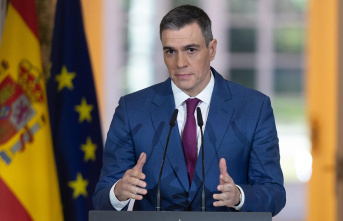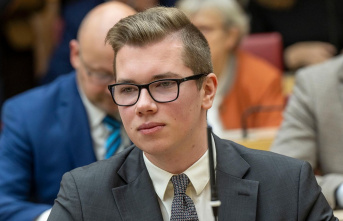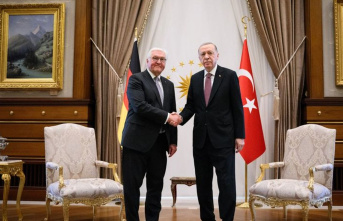That was suddenly the headline on the day of the Economics Minister's trip to Africa: Habeck warns of "green energy imperialism." It was "the last thing we can accept," he said during his visit to Namibia. Anything else would mean that Namibia would develop energy, Europe or Germany would suck it up and leave the country alone for the time being.
Of course, it had previously been extensively about "hyphen", that almost 10 billion investment project with German participation, about the great opportunities for hydrogen production based on renewable energy - also and especially for Germany. After all, that's what this trip to southern Africa with the business delegation is all about.
So now a new tongue stroke. Germany is making Namibia an offer that may differ from other "energy-hungry" economies, Habeck said. It is clear who is meant: China, which is leading countries across Africa into new dependencies with raw material and energy contracts, which is doing one thing above all across the continent: sucking off.
Germany deliberately chose a different path. Everything that happens in Namibia is primarily done for the people, explained Habeck. Germany wants the country to develop more, that people are qualified, that they find jobs and that unemployment falls. The energy supply for Namibia and neighboring South Africa could become more robust and climate-friendly. And what then, at the very end, is left over, Germany would like to take. In the form of green ammonia that could be transported by ship.
Just don't show off, modest partnership, that should be the message. And while parts of the German business delegation were already slightly grumbling about why they had come along on this minister's trip, Habeck once again reached for the philosophical shelf and suddenly a touch of Kant wafted through Windhoek when he added: So to acting is an "ethical imperative".
He doesn't have it any smaller right now. It might not be any smaller. Not with the German colonial history in Namibia, which was then briefly called German South West Africa at the end of the 19th and beginning of the 20th century. That's why it's not smaller, not for him and not so soon after he laid a flower arrangement together with Katja Keul, Minister of State in the Foreign Office, at the memorial for the Herero and Nama murdered by Germans between 1904 and 1908.
Above two figures, a man, a woman, stretching their broken chains into the sky, below a relief, three dead on the gallows, hanged by two men of the German "protection force". The inscription reads: "Your blood waters our freedom".
Habeck then went to the neighboring Independence Museum, a monumental building that North Korea of all things built for Namibia, for a condensed tour of the last 150 years of Namibian history. He looked the freedom fighters of the different generations in the face. From Jan Jonkers to Henrik Witbooi to Sam Nujoma, the first President. Habeck paused for a long time in front of a wall with photos of German crimes. He didn't want to get too close, and yet he had to lean far forward. The photos showed soldiers of the "Schutztruppe", severed skulls, German concentration camps in Namibia - and also a photo with the gallows scene from the memorial.
The subject is not new to him. Habeck said he encountered this first German genocide again and again in his life. There have always been phases in which he dealt with it, read studies and books. "Herero", the thick tome by Gerhard Seyfried, "Morenga", the novel by Uwe Timm. When the book was reprinted in 2000 for Timm's 80th birthday, the writer Timm had asked the writer Habeck to write an afterword.
"I know all that," says Habeck quietly, he knows the photos and stories, "but it's something else when you're standing here in front of it." He also knows that all of this is far too rarely an issue at home in Germany. Namibia is not exactly the focus of German politics. And so Habeck, it surprised him himself, is the highest-ranking German government politician to have visited the country - since Chancellor Helmut Kohl. That was in 1995.
In the meantime, the minister and his entourage have traveled on to neighboring South Africa. He wants to open an economic conference here on Wednesday.












